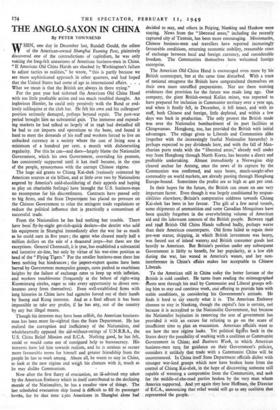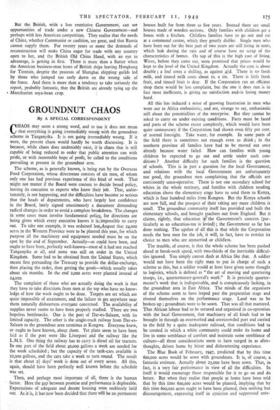THE ANGLO-SAXON IN CHINA
By PETER TOWNSEND
WHEN, one day in December last, Randall Gould, the editor of the American-owned Shanghai Evening Post, plaintively discovered one of the contradictions of capitalism, he was only voicing the long-felt uneasiness of American business-men in China. "If American Old China Hands are shocked by Washington's failure to adjust tactics to realities," he wrote, "this is partly because we see more sophisticated approach in other quarters, and had hoped that the United States had come of age in international affairs. . . What we mean is that the British are always in there trying."
For the past year had sickened the American Old China Hand with too little profitable action and too much troubled thought. An inglorious Hamlet, he could only pensively walk the Bund or end- lessly soliloquise at the club bar. He felt his own and his colleagues' position seriously damaged, perhaps beyond repair. The post-war period brought him no substantial gain. The immense and expand- ing markets he had talked so largely of in 1946 had dwindled till he had to cut imports and operations to the bone, and found it hard to meet the demands of his staff and workers forced to live on unbacked currency in a society where the cost of living rose a minimum of a hundred per cent, a month with disheartening regularity. For this he can—and does—largely blame the Nationalist Government, which his own Government, overriding his protests, has consistently supported until it has itself become, in the eyes of the people, synonymous with the corrupt Chinese regime.
The huge aid grants to Chiang Kai-shek (variously estimated by American sources at six billion, and at little over two by Nationalists angered by America's cold-shouldering of their appeals and hoping to play on charitable feelings) have brought the U.S. business-man no recompense for his discomfitures. Contracts have passed only to big firms, and the State Department has placed no pressure on the Chinese Government to relax the stringent trade regulations or reduce the political influence that is practically a concomitant of successful trade.
From the Nationalists he has had nothing but trouble. There have been' fly-by-night get-rich-quickc dealers—the dentist who sold his equipment in Shanghai immediately after the war for as much as he could earn in five years ; the agent who cleared nearly half a million dollars on the sale of a thousand jeeps—but these are the exceptions. General Chennault, it is true, has established a substantial and lucrative air-line, but only by virtue of his war-time position as head of the "Flying Tigers." For the smaller business-man there has been nothing but hindrances ; the import-export quotas have been barred by Government monopolist groups, costs pushed to exorbitant heights by the failure of exchange rates to keep up with inflation, and workers troublesome (frequently at the behest of right-wing Kuomintang circles, eager to take every opportunity to divert rest- lessness away from themselves). Even well-established firms with long histories in China have had agencies forced out of their hands by Soong and Kung interests. And as a final affront it has been impossible to take any profits, if he has any, out of the country by any but illegal means.
Though his interests may have been selfish, the American business- man has been more far-sighted than the State Department. He has realised the corruption and inefficiency of the Nationalists, and wholeheartedly opposed the aid-without-strings of U.N.R.R.A., the U.S. China Relief Mission and E.C.A. Nothing good, he has felt, could or would come out of continued help to bureaucracy. His interests have led him towards realism, and he is anxious to secure more favourable terms for himself and greater friendship from the people he has to work among. Above all, he wants to stay in China, to look at the new regime and weigh his chances with it, much as he may dislike Communism.
Now after the first flurry of evacuation, an ili-advised step taken by the American Embassy which in itself contributed to the declining morale of the Nationalists, he has a steadier view of things. The last scheduled evacuation ship found it difficult to fill its passenger berths, for by that time 2,500 Americans in Shanghai alone had decided to stay, and others in Peiping, Nanking and Hankow were staying. News from the "liberated areas," including the recently captured city of Tientsin, has been more encouraging. Missionaries, Chinese business-men and travellers have reported increasingly favourable conditions, returning economic stability, reasonable rates of exchange between local and foreign currency, and considerable freedom. The Communists themselves have welcomed foreign enterprise.
The American Old China Hand is encouraged even more by his British counterpart, but at the same time disturbed. With a trace of national smugness the British have congratulated themselves on their own more unruffled preparations. Nor are there wanting evidences that provision for the future was made long ago. One company, the giant British-owned Kailan mines, was reported to have prepared for inclusion in Communist territory over a year ago, and when it finally fell, in December, it fell intact, and with its staff, both Chinese and foreign, little depleted, and within a few days was back in production. The only protest the British made was over the Nationalist bombardment of its port facilities at Chingwantao. Hongicong, too, has provided the British with initial advantages. The refuge given to Liberals and Communists alike (together with the increasingly fearful Nationalist hierarchy) is perhaps expected to pay dividends later, and with the fall of Man- churian ports trade, with the "liberated areas," already well under way from Hongkong through North Korea, has become a direct and profitable undertaking. Almost immediately a Norwegian ship cleared anchor for Antung, once the news of its capture by the Communists was confirmed, and soya beans, much-sought-after commodity on world markets, are already passing through Hongkong Europe-bound. Sometimes the profits are as high as 400 per cent.
In their hopes for the future, the British can count on one very important factor. Even though it was largely conditioned by respon- sibilities elsewhere, 'Britain's comparative coldness towards Chiang Kai-shek has been in her favour. The gift of a few naval vessels, some shipments of ammunition and some Canadian Mosquitoes have been quickly forgotten in the overwhelming volume of American aid and the lukewarm concern of the British people. Between 1946 and 1948 British Old China Hands suffered badly, perhaps worse than their American counterparts. Old firms failed to regain their pre-war status; shipping, in which British investment was heavy, was forced out of inland waters k and British consumer goods lost heavily to American. But Britain's position under any subsequent Government is likely to benefit, for her popularity, at a low ebb during the war, has waxed as America's wanes, and her non- interference in China's affairs makes her acceptable to Chinese Liberals.
To the American still in China today the better fortune of the British is cold comfort. He turns from reading the mimeographed Rieets sent through his mail by Communist and Liberal groups tell- ing him to stay and continue work, and offering to provide him with stable conditions, to considering his Government's attitude. He finds it hard to say exactly what it is. The American Embassy chooses to stay in Nanking, though the capital's fate is certain, not because it is accredited to the Nationalist Government, but because the Nationalist hesitation in removing the seat of government has provided it with an excuse for refusing to go on the score of insufficient time to plan art evacuation. American officials Want to see how the new regime looks. Yet political figuies back in the States decry the possibility of working with a coalition or Communist Government in China; and Business Week, to which American business-men tur4 for guidance on their Government's policies, considers it unlikely that trade with a Communist China will be countenanced. In China itself State Department officials dicker with stronger war-lord groups which now have broken loose from the control of Chiang Kai-shek, in the hope of discovering someone still capable of wresting a compromise from the Communists, and seek for the middle-of-the-road parties broken by the very man whom America supported. And yet again they hear Hoffman, the Director of E.C.A., announcing that relief would still go to any coalition that represented the people.
But the British, with a less restrictive Government, can see opportunities of trade under a new Chinese Government—and perhaps with less American competition. They 'realise that the needs of China, whether Communist or coalition, are great, and that Russia cannot supply them. For twenty years or more the demands of reconstruction will make China eager for trade with any country open to her, and the British Old China Hand, with an eye to advantage, is getting in first. There is more than a flutter when the American business-man hears of British ships leaving Hongkong for Tientsin, despite the protests of Shanghai shipping guilds led by those who jumped too early down on the wrong side of the fence. And there is more than a tendency to take seriously the report, probably fantastic, that the British are already tying up the • Manchurian soya-bean crop.







































 Previous page
Previous page